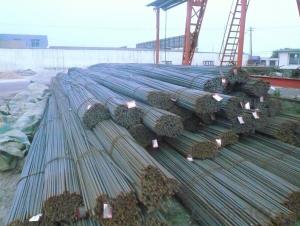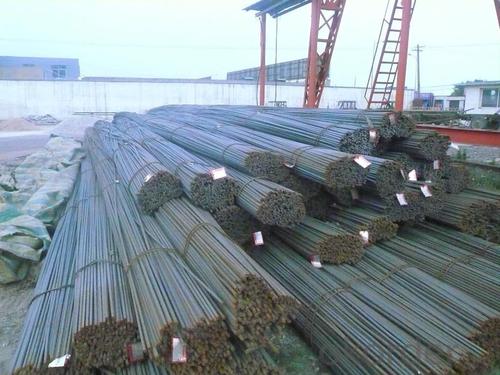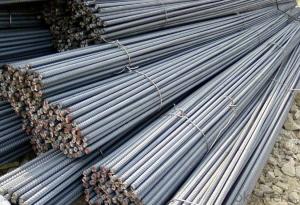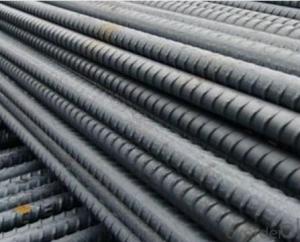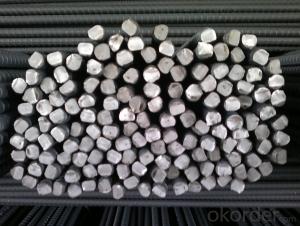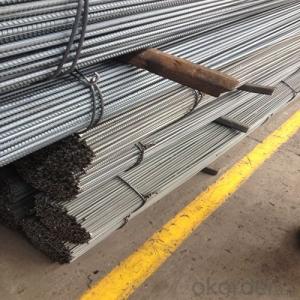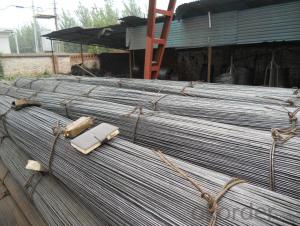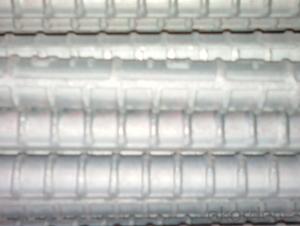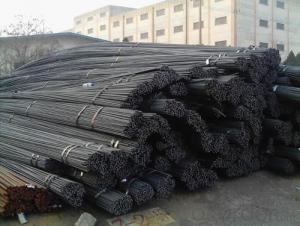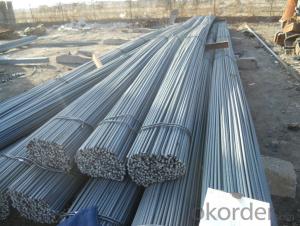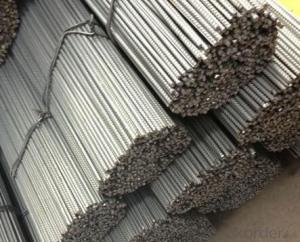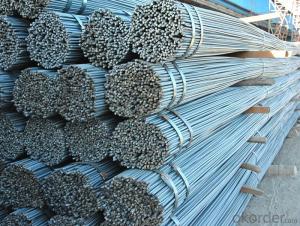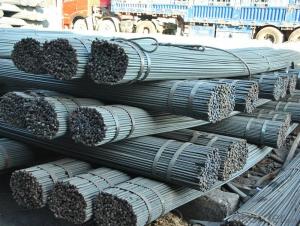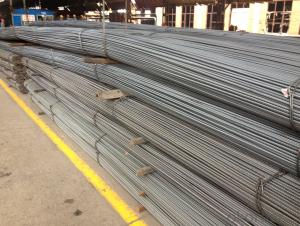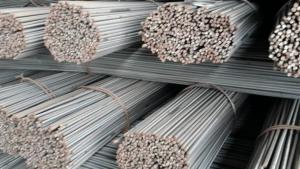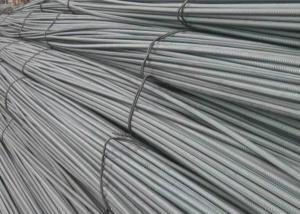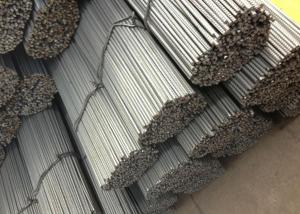steel rebar, deformed steel bar, Iron Rods For Construction
- Loading Port:
- Shanghai
- Payment Terms:
- TT OR LC
- Min Order Qty:
- 100 m.t.
- Supply Capability:
- 1000 m.t./month
OKorder Service Pledge
OKorder Financial Service
You Might Also Like
deformed steel bar grade 40
material: HRB400, BS4449 GR460B
size: 8-36mmx12m.
short delivery time by bulk or container
deformed steel bar grade 40
material: HRB400, BS4449 GR460B
size: 8-36mmx12m.
short delivery time with bulk or container
packing: Mill standard export packing in bundles/coil, around 2tons/bundle.
country of Origin: China
delivery Time: Within a 35 days
Shipment: by bulk vessel or by container
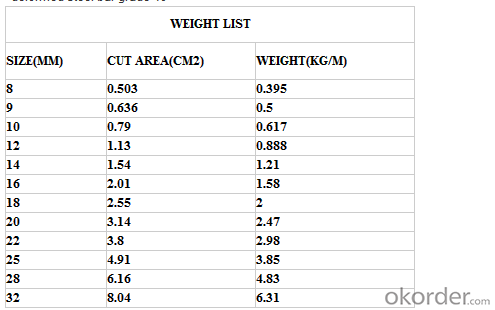
Leading goods:
section steel:angles,channels,I-beam,H-beam;
coils:cold/hot rolled coils,PPGI,galvanized coils,plate,checkered plate,cutting steel plate,steel strip;
wire rod:steel wire,deformed wire,bar;
pipe:seamless pipe,rectangular pipe,welded pipe,spiral welded pipe,pipe fittings;
stainless steel:steel sheets,stainless steel strips,stainless bar,stainless tube;
special:weathering steel,shipbuilding steel;
construction steel:C-channel,Z-channel,T-bar,high-speed divider plate,corrugated steel plate,steel grating.
Advantage:
We are the spot supplier, Six huge warehouses which can hold 20,000 MT goods.
It makes the cost lower than others,we can provide the competitive price for you.
Delivery time:
Normal sizes can be provided in 7days, the others should be ready in 30---45 days.
Further treatment:
We can offer cutting,painting,drilling holes,bending,threading, welding,galvanization,packing etc.
Security interest:
We have already passed the ISO9001, BV and SGS authentication which makes the quality secured.
If you have the interest in any of the products we can provided, pls don't hesitate to connect with me. Looking forward to cooperate with you.
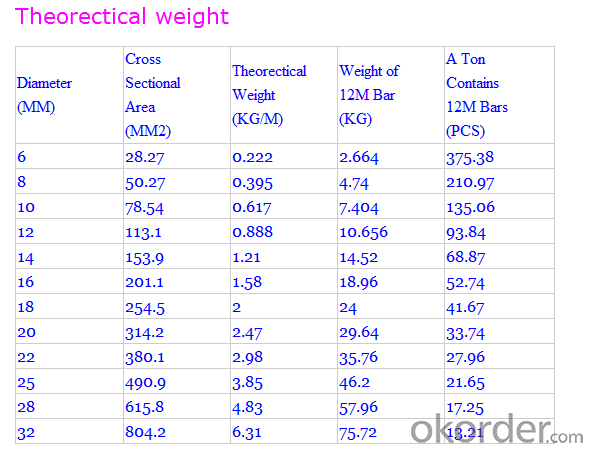
FAQ of Steel Deformed Bar
1. More than 10 years experience in this industry
2. 100,000 tons exporting per month
3. Professional foreign trade tea
4. OEM&ODM capacity
5. High quality assured & competitive price
6. Try our best to meet your needs & save your budget
7. Very popular in Southeast Asia, Africa, Mid-East and South America etc.
8. VIP membership system, first time customers and long-term cooperation customers can get extra discount on some products.
- Q: Can steel rebars be used in reinforced masonry structures?
- Yes, steel rebars can be used in reinforced masonry structures. They are commonly used to provide additional strength and reinforcement to masonry walls and structures, helping to resist tensile forces and improve overall structural integrity.
- Q: How are steel rebars affected by long-term exposure to water?
- Steel rebars are prone to corrosion when exposed to water for extended periods of time. The water facilitates the process of oxidation, leading to the formation of rust on the surface of the rebars. This corrosion weakens the integrity of the steel, reducing its load-bearing capacity and overall structural strength. Therefore, long-term exposure to water can significantly deteriorate steel rebars, compromising the durability and safety of structures they are used in.
- Q: How are steel rebars protected against damage from chemical exposure?
- Steel rebars are protected against damage from chemical exposure through a process called corrosion protection. This involves applying a protective coating, such as epoxy or zinc, to the rebars. Additionally, rebars can be encased in concrete, which acts as a barrier against chemical attacks. These protective measures prevent the rebars from deteriorating and ensure their durability in harsh chemical environments.
- Q: Can steel rebars be used in railway bridge construction?
- Yes, steel rebars can be used in railway bridge construction. Steel rebars provide strength and durability to the bridge structure, making them suitable for supporting heavy loads and withstanding the dynamic forces exerted by trains. They are commonly used in the construction of railway bridges to reinforce and strengthen the concrete components of the bridge, enhancing its overall structural integrity.
- Q: How do steel rebars affect the overall safety of construction projects?
- Steel rebars play a crucial role in enhancing the overall safety of construction projects. By reinforcing concrete structures, rebars significantly increase their strength, durability, and resistance to various forces such as tension, compression, and shear. This reinforcement helps prevent structural failure, collapse, and damage caused by external factors like earthquakes, heavy loads, or extreme weather conditions. Ultimately, the use of steel rebars ensures the stability and integrity of construction projects, ensuring the safety of occupants and the longevity of the structures.
- Q: What is the resistance of steel rebars against acid attacks?
- Steel rebars have a high resistance against acid attacks due to their inherent corrosion-resistant properties. The steel's protective oxide layer helps prevent the acid from penetrating and causing significant damage to the rebars. However, prolonged exposure to highly concentrated or aggressive acids may eventually lead to corrosion, necessitating appropriate protective measures.
- Q: What is the minimum diameter of steel rebars used in construction?
- The minimum diameter of steel rebars used in construction typically ranges from 6 to 10 millimeters, depending on the specific requirements and regulations of the project.
- Q: What is the difference between steel rebars and steel mesh?
- Steel rebars and steel mesh are both widely used in construction as reinforcement materials, but they differ in their shape and application. Rebars are long, cylindrical bars that are typically used to reinforce concrete structures, such as beams, columns, and slabs. They are placed in a grid-like pattern and provide tensile strength to the concrete, preventing it from cracking under pressure. On the other hand, steel mesh consists of interconnected wires that form a grid or sheet-like pattern. It is commonly used in applications such as concrete pavements, sidewalks, and walls. Steel mesh provides both tensile and shear strength to the concrete, distributing the load more evenly and reducing the risk of cracking. In summary, rebars are used for localized reinforcement in specific areas, while mesh provides overall reinforcement across larger surfaces.
- Q: How do steel rebars improve the load-carrying capacity of concrete?
- Steel rebars improve the load-carrying capacity of concrete through a combination of reinforcement and strength enhancement. When steel rebars are embedded within the concrete, they provide tensile strength to a material that is otherwise weak in tension. This is because concrete is strong in compression but relatively weak in tension. The rebars act as a support system within the concrete, distributing the load more evenly and preventing cracks or failure. When a load is applied to the concrete, the rebars resist the tensile forces and help to hold the concrete together, increasing its ability to carry and distribute the load. Furthermore, steel rebars also enhance the ductility of concrete. Ductility refers to the ability of a material to deform without fracturing. By adding steel rebars, the concrete becomes more flexible and capable of withstanding greater stress and strain without failure. This is particularly important in structures subject to earthquakes, as the ability to absorb and dissipate energy is crucial for their overall integrity. In summary, steel rebars improve the load-carrying capacity of concrete by reinforcing it with tensile strength, distributing the load more evenly, preventing cracks, and enhancing its overall ductility. This combination of reinforcement and strength enhancement significantly increases the structural stability and durability of concrete structures.
- Q: Can steel rebars be used in structures with aggressive chemical exposure?
- Steel rebars can be used in structures with aggressive chemical exposure, but their performance may be compromised depending on the specific chemicals involved. It is crucial to select the appropriate type of steel with corrosion-resistant properties or use protective coatings to prevent degradation and maintain structural integrity. Additionally, regular maintenance and monitoring are required to ensure the rebars' durability in such environments.
Send your message to us
steel rebar, deformed steel bar, Iron Rods For Construction
- Loading Port:
- Shanghai
- Payment Terms:
- TT OR LC
- Min Order Qty:
- 100 m.t.
- Supply Capability:
- 1000 m.t./month
OKorder Service Pledge
OKorder Financial Service
Similar products
Hot products
Hot Searches
Related keywords
